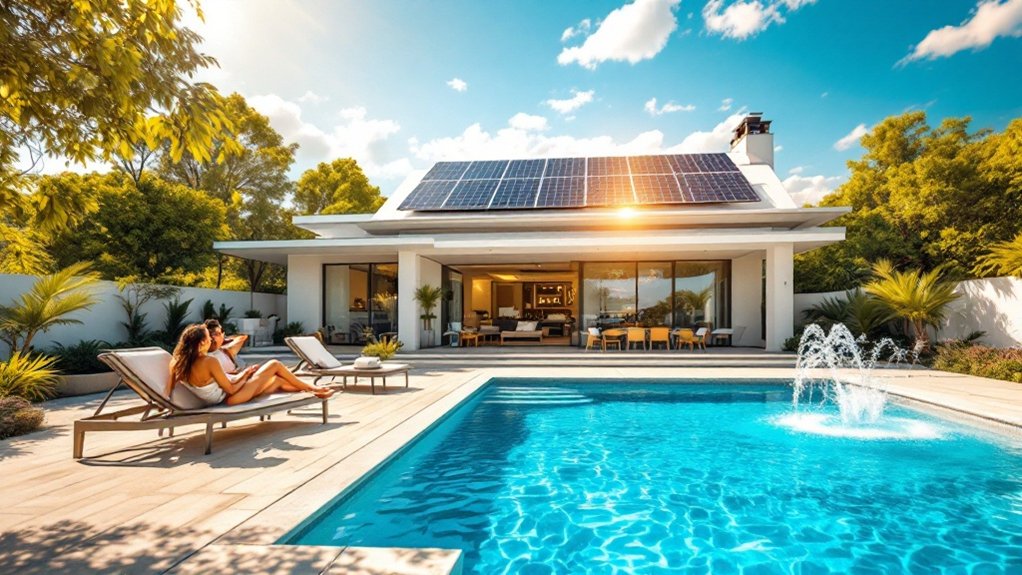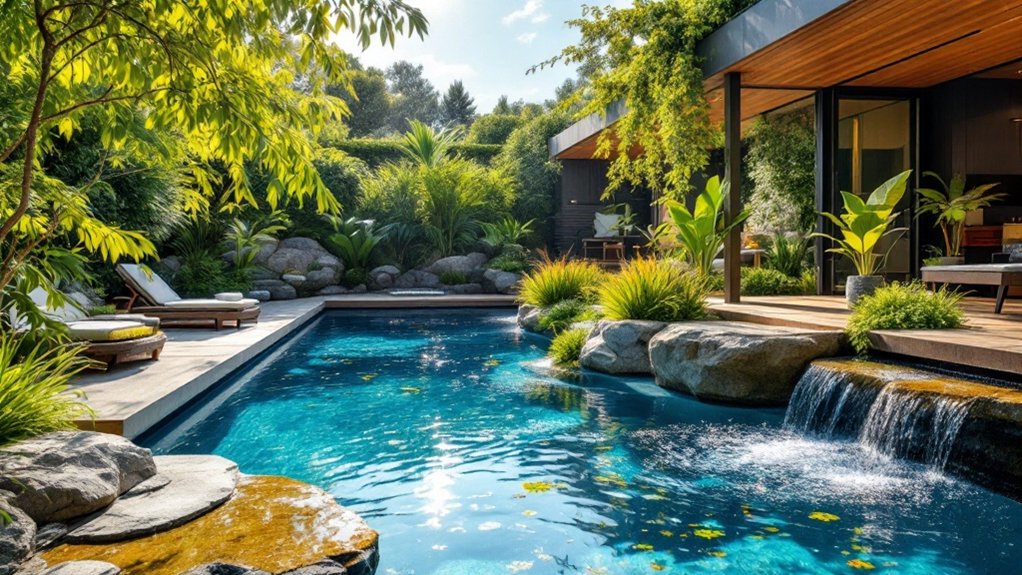Solar-powered pool systems present a compelling option for homeowners seeking efficient heating solutions. They substantially cut energy costs and contribute to a more sustainable environment. Additionally, these systems can enhance the swimming experience by extending the season. With their low maintenance needs and potential to boost property values, the advantages are clear. However, the intricacies of installation and design options warrant further exploration. What makes these systems a worthwhile investment?
Cost Savings on Energy Bills
As homeowners increasingly seek sustainable solutions, solar-powered pool systems emerge as a notable way to reduce energy costs. These systems harness the sun’s energy to heat pool water, considerably lowering reliance on traditional energy sources. By utilizing solar panels, homeowners can generate their own power, translating to lower monthly energy bills. Initial investments in solar technology may appear high, but the long-term savings often outweigh the upfront costs. Many users report savings of up to 80% on their pool heating expenses. Additionally, solar-powered systems require minimal maintenance, further contributing to reduced long-term spending. As energy prices continue to rise, these systems present a financially attractive option for homeowners aiming to maintain their pools affordably while embracing renewable energy solutions.
Environmentally Friendly Heating Solution
Solar-powered pool systems represent a significant step toward sustainable living by utilizing renewable energy sources for heating. This approach not only reduces reliance on fossil fuels but also contributes to a diminished carbon footprint. As more individuals adopt these systems, the potential for positive environmental impact grows substantially.
Renewable Energy Source
Harnessing the sun’s energy, solar-powered pool systems offer an environmentally friendly heating solution that markedly reduces reliance on traditional energy sources. These systems utilize solar panels to convert sunlight into usable energy, directly heating pool water without emitting harmful pollutants. This renewable energy source operates effectively in various climates, making it a versatile option for pool owners. By integrating solar technology, users can achieve efficient heating while minimizing energy costs. The ability to harness a sustainable resource like sunlight provides a significant advantage over fossil fuels, promoting a cleaner and more sustainable approach to pool heating. As awareness of renewable energy grows, solar-powered pool systems stand out as a responsible choice for environmentally conscious consumers.
Reduced Carbon Footprint
While traditional pool heating methods often contribute to significant carbon emissions, solar-powered pool systems provide a compelling alternative that promotes a reduced carbon footprint. By harnessing the sun’s energy, these systems eliminate the reliance on fossil fuels typically used in conventional heating methods. This shift not only decreases greenhouse gas emissions but also minimizes air pollution, contributing positively to environmental health. As solar-powered systems require minimal maintenance and have no emissions during operation, they stand out as an eco-friendly choice for pool owners. Additionally, the use of renewable energy optimizes resource consumption, aligning with global efforts to combat climate change. Ultimately, solar-powered pool systems represent a sustainable heating solution that benefits both users and the environment.
Extended Swimming Season
As temperatures begin to drop in the fall, many pool owners often resign themselves to closing their pools for the season. However, solar-powered pool systems can greatly extend the swimming season, allowing for enjoyable dips even as the weather cools. By harnessing the sun’s energy, these systems effectively warm the pool water, maintaining comfortable temperatures well into the autumn months. This capability not only enhances the swimming experience but also maximizes the investment in the pool, as families can enjoy its benefits for a longer period. Furthermore, the ability to swim later in the year promotes a more active lifestyle and can foster cherished family memories during the pleasant fall days, making solar-powered systems a valuable addition to any home with a pool.
Low Maintenance Requirements
One of the significant advantages of solar-powered pool systems is their low maintenance requirements. Unlike traditional heating systems, which often rely on complex machinery and fuel sources, solar systems use straightforward technology that minimizes the need for repairs and upkeep. With fewer moving parts, there is a reduced risk of mechanical failure. Regular maintenance typically involves simple tasks, such as cleaning the solar panels to guarantee peak efficiency. Additionally, solar-powered systems do not require the same level of oversight as gas or electric heaters, freeing pool owners from frequent inspections. This simplicity not only saves time but also lowers costs associated with professional maintenance services, making solar solutions an attractive option for those seeking a hassle-free pool experience.
Increased Property Value
Investing in solar-powered pool systems can greatly enhance a property’s value, particularly in today’s eco-conscious market. Homebuyers increasingly seek energy-efficient features, viewing solar systems as a long-term investment. Properties equipped with solar-powered pools not only appeal to environmentally aware buyers but also promise lower operational costs. This can lead to a quicker sale and potentially higher offers. Moreover, local real estate assessments often recognize energy-efficient innovations, translating to increased market value. Additionally, these systems contribute to sustainability, aligning with modern lifestyle preferences. Consequently, homeowners who install solar-powered pools not only enjoy immediate benefits but also position themselves favorably within the competitive real estate landscape. Ultimately, such investments reflect a commitment to both quality living and environmental responsibility.
Easy Installation Process
The installation of solar-powered pool systems is surprisingly straightforward, making it an attractive option for many homeowners. Most systems come with user-friendly instructions that allow even those with minimal technical skills to complete the setup. Typically, the process involves mounting solar panels on the roof or an appropriate ground area, connecting the panels to the pool’s existing filtration system, and ensuring proper alignment for ideal sun exposure. Additionally, many manufacturers offer pre-assembled kits that further simplify installation. With the right tools and a little preparation, homeowners can enjoy the benefits of solar energy for their pools without the need for professional assistance. This ease of installation not only saves time but also reduces overall costs.
Versatile Design Options
How can homeowners enhance their outdoor aesthetics while maximizing energy efficiency? Solar-powered pool systems provide versatile design options that cater to various tastes and preferences. Homeowners can select from a range of styles, including sleek and modern panels or traditional rooftop installations, integrating seamlessly with existing architecture. Additionally, customizable layouts allow for strategic placement, ensuring ideal sunlight exposure and minimal visual disruption. These systems can also be paired with eco-friendly landscaping, creating an inviting atmosphere that complements the pool area. With options to incorporate artistic elements such as decorative covers or solar umbrellas, homeowners can maintain their unique design vision while benefiting from renewable energy. Ultimately, solar-powered pool systems offer an array of choices to enhance both beauty and functionality.
Reliable Performance and Durability
While energy efficiency and aesthetic appeal are essential, reliable performance and durability are paramount when selecting solar-powered pool systems. These systems are designed to withstand various weather conditions and prolonged exposure to sunlight, ensuring consistent heating for pools year-round. High-quality materials, such as UV-resistant plastics and corrosion-resistant metals, contribute to their longevity, minimizing maintenance needs and replacement costs. Additionally, advanced technology in solar panels enhances their efficiency and effectiveness, allowing them to function at peak performance even on cloudy days. By investing in a durable solar-powered pool system, homeowners can enjoy peace of mind, knowing their investment will provide dependable service for years, reducing energy costs and enhancing the swimming experience without compromising on reliability.
Frequently Asked Questions
How Long Do Solar Pool Systems Typically Last?
Solar pool systems generally have a lifespan of 15 to 25 years, depending on factors like maintenance, climate, and quality of materials. Regular upkeep can greatly enhance their longevity and overall performance over time.
Can Solar Pool Heaters Work in Cloudy Weather?
Solar pool heaters can function in cloudy weather, although their efficiency decreases compared to sunny conditions. They still capture some solar energy, allowing for moderate heating, which can help maintain comfortable pool temperatures during overcast days.
Are Solar Pool Systems Noisy During Operation?
Solar pool systems generally operate quietly, producing minimal noise during function. Most components, such as pumps and filters, are designed for efficiency and low sound levels, ensuring a peaceful environment around the pool during use.
What Size Solar System Do I Need for My Pool?
Determining the appropriate size of a solar system for a pool involves considering factors such as pool size, geographic location, and desired temperature. A professional assessment can provide tailored recommendations for ideal efficiency and performance.
Do Solar Pool Systems Require Special Permits for Installation?
The necessity of special permits for solar pool system installation varies by location. Local regulations often dictate whether permits are required, so individuals should consult their municipality to ascertain compliance with zoning and building codes.
Conclusion
To summarize, solar-powered pool systems offer a multitude of advantages that make them an appealing choice for homeowners. By greatly reducing energy costs and promoting environmentally friendly practices, these systems enhance the swimming experience while fostering a sustainable lifestyle. Their low maintenance needs and potential to increase property value further solidify their status as a wise investment. Ultimately, embracing solar technology not only benefits individual homeowners but also contributes positively to the broader community and environment.




